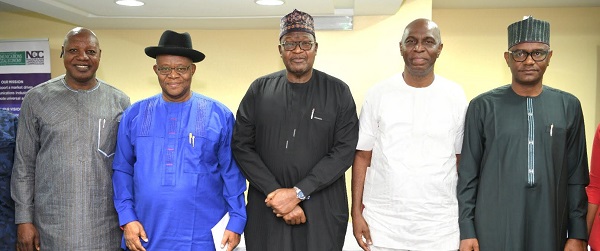
The executive vice-chairman (EVC) of the Nigerian Communications Commission (NCC), Prof. Umar Garba Danbatta officially announced that the investment profile in Nigeria’s telecommunications sector, including foreign direct investment (FDI) and local investment, has reached $75.6 billion as of 2021.
During an interactive session with stakeholders in the communications media ecosystem in Lagos on Wednesday, Danbatta shared his scorecard and highlighted the significant developments that have shaped the growth of the telecoms sector since he assumed the role of chief telecom regulator in August 2015.
Danbatta revealed that in 2018, the investment profile in the sector was $68 billion, which increased to $70.5 billion in 2019 and $72 billion in 2020. By the end of 2021, the figure had risen to $75,560,563,417.79 ($75.6 billion). This latest figure represents the current official investment profile in the industry, surpassing the initial $70 billion investment made in the past few years.
The calculation of investment in the telecommunications sector in Nigeria is derived from two sources: the Central Bank of Nigeria (CBN) and financial data obtained from service providers by the commission. The CBN collects and calculates various elements of the telecoms sector, including FDI and portfolio investments. Meanwhile, the commission collects investment figures from telecom licensees, which are described as domestic investments arising from capital expenditure (CAPEX) and form part of the total investment in the industry.
The NCC CEO highlighted that the effective regulatory environment established by the Commission has resulted in tremendous growth in the telecom sector. The initial investment profile of $500 million in 2001, when the sector was fully liberalised, has now reached $75.6 billion.
Furthermore, Danbatta emphasised that the telecom sector continues to be a major contributor to Nigeria’s economy, making an impressive contribution to the nation’s gross domestic product (GDP). The sector contributed N10.126 trillion to the nation’s GDP in 2022 alone, representing a substantial increase from about 8.5 per cent in the third quarter of 2015.
Citing data from the National Bureau of Statistics (NBS), Danbatta stated that the telecoms sector’s aggregate quarterly contribution to GDP in 2022 amounted to N10.126 trillion. The first quarter contributed 12.94 per cent, equivalent to N2.246 trillion, while the second quarter reached an all-time high of 15 per cent, valued at N2.593 trillion. The sector’s contribution in the third quarter was 12.85%, and it grew to 13.55 per cent in the fourth quarter, amounting to N2.436 trillion and N2.851 trillion, respectively.
The growth trajectory continued in 2023, with the telecommunications and Information Services sector contributing a significant N2.508 trillion to the nation’s GDP, representing 14.13 per cent in the first quarter.
Since Prof. Danbatta assumed the role of EVC of NCC in August 2015, the telecoms sector’s contribution to the national GDP has shown remarkable growth. It increased from 8.50 per cent in 2015 to 9.13 per cent in 2016 and 8.66 per cent in 2017. In the last quarter of 2018, it contributed 9.85 per cent to the national GDP, and in the fourth quarter of 2019, it reached 10.60 per cent. Additionally, in the second quarter of 2021, it contributed 14.30 per cent, and in the second quarter of 2022, it reached its highest quarterly contribution of 15 per cent.
Overall, Danbatta emphasised that the telecoms sector has become a major driver of economic development in Nigeria, positively impacting all facets of the economy. He expressed satisfaction with the sector’s phenomenal growth over the past two decades since its liberalisation and emphasised the commission’s commitment to continue pushing for greater achievements and expanding Nigeria’s footprint in the global digital economy.
In addition to investment and GDP contributions, Danbatta provided updates on key indicators in the telecoms sector. As of May 2023, active voice subscriptions reached 221.3 million, equivalent to 115.91 per cent tele-density, while Internet subscriptions rose to 159.6 million. Broadband subscriptions on 3G and 4G networks increased to 92.2 million, representing a 48.28 per cent broadband penetration in the country.
Furthermore, following the issuance of 3.5GHz spectrum licenses for the deployment of 5G networks in Nigeria, 5G subscriptions have grown to over 60,000 in many cities across 12 states of the Federation. This marks a significant milestone in the country’s journey towards ultra-high-speed internet, low latency, and high-capacity connectivity.
Danbatta assured stakeholders of the commission’s commitment to supporting a friendly investment climate in Nigeria and enhancing value for money for telecom consumers. He commended the media for their role as strategic partners and enablers of growth in the telecom sector, highlighting their accurate, adequate, and timely reporting of all regulatory activities of the Commission.
In conclusion, the telecoms sector in Nigeria has experienced remarkable growth, with investments reaching $75.6 billion and making significant contributions to the nation’s GDP. The sector continues to play a pivotal role in driving economic development and digital transformation in Nigeria, and the NCC remains dedicated to furthering its growth and expanding its impact in the years to come.


